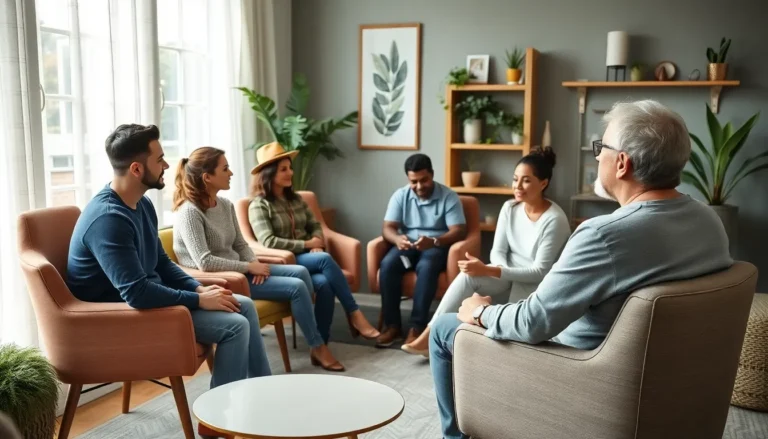Table of Contents
ToggleIn today’s fast-paced world, mental health is more important than ever. The mental health community plays a vital role in providing support and resources for those navigating the complexities of emotional well-being. From therapy groups to online forums, these spaces foster connection and understanding, helping individuals feel less isolated in their struggles.
As awareness around mental health continues to grow, so does the need for inclusive and accessible support systems. The mental health community not only offers a safe haven for sharing experiences but also educates members about coping strategies and treatment options. By engaging with this community, individuals can find hope, healing, and a sense of belonging.
Overview of Mental Health Community
The mental health community encompasses a diverse range of individuals and organizations dedicated to promoting mental well-being. This community includes therapists, counselors, support groups, non-profit organizations, and online platforms, all working towards the common goal of enhancing mental health awareness and support.
The community provides various resources aimed at fostering connections among individuals facing mental health challenges. These resources include therapy groups, peer support systems, and educational workshops. By facilitating open dialogues, community members can share their experiences and learn from one another, reducing feelings of isolation.
Education plays a vital role within the mental health community. Workshops and seminars deliver valuable information on coping strategies, treatment options, and available resources. These educational initiatives empower individuals to take charge of their mental health, equipping them with tools necessary for resilience.
Access to mental health services significantly improves through community networks. Many organizations offer sliding scale fees, teletherapy options, and crisis intervention services. Such accessibility ensures that those in need can find support regardless of their financial situation.
Advocacy also forms a crucial aspect of the mental health community. Advocacy groups work to reduce stigma, promote policy changes, and secure funding for mental health initiatives. By engaging in these activities, the community amplifies the voices of individuals affected by mental health issues, fostering systemic change.
Ultimately, the mental health community aims to create a supportive environment where individuals can thrive and find hope in their healing journeys.
Importance of Mental Health Support

Mental health support plays a crucial role in individual well-being, fostering emotional resilience and enhancing quality of life. Access to resources and community connections significantly influences coping strategies and promotes recovery.
Emotional and Psychological Benefits
Emotional and psychological benefits of mental health support include reduced anxiety and depression symptoms, improved self-esteem, and heightened emotional awareness. Support systems offer individuals safe environments to express feelings and thoughts. Group therapy sessions and peer discussions often cultivate understanding, leading to healthier emotional regulation. Educational resources provide coping techniques, which empower individuals to manage stress effectively.
Social Connection and Belonging
Social connection and belonging are vital components of mental health support. Community interactions help reduce feelings of isolation, creating a sense of camaraderie among participants facing similar challenges. Support groups foster relationships that enhance emotional and psychological well-being. The shared experiences often create bonds, resulting in increased trust and understanding. These connections contribute to a supportive atmosphere that encourages individuals to seek help and share their journeys.
Types of Mental Health Communities
Various types of mental health communities exist, each providing unique types of support and connection to individuals seeking help. These communities create safe spaces for sharing experiences and learning valuable coping strategies.
Online Support Groups
Online support groups connect individuals with similar mental health challenges through virtual platforms. Members can share their experiences and feelings anonymously, which often reduces stigma and encourages open dialogue. Technology facilitates access to resources, increasing participation from those unable to attend in-person meetings. Examples of platforms hosting such groups include Facebook, Reddit, and dedicated websites like Mental Health America and NAMI. Many online groups feature trained moderators who guide discussions and offer support, creating a structured environment for healing. Topics often range from anxiety and depression to specific disorders, providing focused discussions that resonate with members.
In-Person Meetups
In-person meetups offer face-to-face interactions, fostering a sense of community and camaraderie. These gatherings take place in various settings, including community centers, schools, and therapy offices. Members engage in structured activities, discussions, and workshops that promote emotional healing. Support groups often operate under specific themes, such as grief, addiction, or PTSD, allowing participants to connect deeply with others who face similar challenges. Local branches of organizations like the National Alliance on Mental Illness (NAMI) and Mental Health America frequently host these events. Attending in-person meetups enhances social connections, empowering individuals to build supportive relationships vital for their mental health journeys.
Resources for Building a Mental Health Community
Building a mental health community requires access to various resources, including local organizations, initiatives, and digital platforms that facilitate support and connection.
Local Organizations and Initiatives
Local organizations play an essential role in fostering mental health communities. These groups offer services such as:
- Support Groups: Weekly meetings for individuals facing similar mental health challenges provide a platform for sharing experiences and coping strategies.
- Workshops and Seminars: Educational sessions focus on mental wellness, equipping participants with tools to manage their conditions effectively.
- Advocacy Programs: Initiatives aim to reduce stigma by promoting awareness campaigns and policy changes that enhance mental health services.
- Crisis Hotlines: Availability of confidential support through dedicated helplines enables individuals to access immediate assistance during crises.
Examples of local organizations include the National Alliance on Mental Illness (NAMI) and Mental Health America, which serve as vital resources for individuals seeking support and information.
Digital Platforms and Online Forums
Digital platforms and online forums expand the reach of mental health communities. These resources create safe spaces for individuals to connect and share, with distinctive features such as:
- Anonymous Posting: Users can share thoughts and experiences without revealing their identity, encouraging open dialogue.
- Peer Support Networks: Members can connect with others facing similar challenges, fostering empathy and understanding.
- Educational Resources: Access to articles, videos, and webinars helps individuals learn about mental health issues and coping mechanisms.
- Virtual Therapy Options: Teletherapy provides convenient access to licensed professionals, making mental health support more accessible.
Notable online platforms include Reddit’s mental health forums and various mobile apps tailored for mental wellness, offering diverse support options to users.
Challenges Facing Mental Health Communities
Mental health communities face significant challenges that hinder their effectiveness and outreach. Two main issues include stigma and misunderstanding, as well as accessibility and inclusivity problems.
Stigma and Misunderstanding
Stigma surrounding mental health remains pervasive, leading to misconceptions and negative stereotypes. Individuals often fear judgment when seeking help, resulting in isolation and reluctance to participate in mental health communities. Misunderstandings about mental illness can deter individuals from accessing necessary resources and support. Education and awareness campaigns, such as those led by organizations like NAMI, seek to combat this stigma by promoting open dialogue and understanding the complexities of mental health conditions. These efforts reinforce the message that mental health struggles are common and should be met with compassion and support, not discrimination.
Accessibility and Inclusivity Issues
Accessibility to mental health services poses significant challenges within communities. Many individuals face barriers due to geographical limitations, financial constraints, or lack of transportation. Rural areas often lack adequate mental health facilities, limiting options for those seeking help. Additionally, financial challenges, including high therapy costs, can discourage individuals from pursuing necessary treatment. Inclusivity issues also arise, as marginalized groups may find it difficult to connect with resources that appropriately address their needs. Mental health communities need to prioritize strategies such as teletherapy, sliding scale payment options, and advocacy for policy changes to enhance access and ensure that services cater to diverse populations. These initiatives can create a more inclusive environment that fosters mental well-being.
The mental health community plays a vital role in fostering emotional well-being and resilience. By providing a network of support and resources, it empowers individuals to navigate their mental health journeys with confidence. The connections formed within these communities not only combat isolation but also promote understanding and acceptance.
As awareness continues to grow, the importance of accessible and inclusive mental health resources becomes increasingly clear. Advocacy efforts and educational initiatives are essential in reducing stigma and ensuring that everyone can find the support they need. By working together, the mental health community can create an environment where individuals feel valued, understood, and hopeful about their healing processes.







